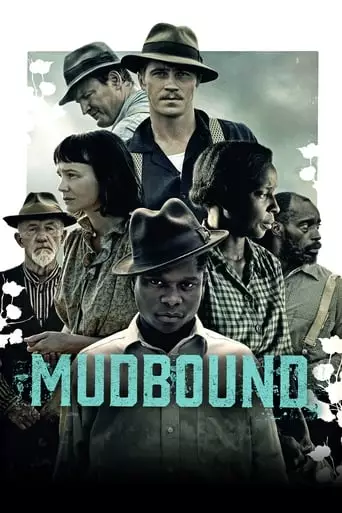
In the post–World War II South, two families are pitted against a barbaric social hierarchy and an unrelenting landscape as they simultaneously fight the battle at home and the battle abroad.
Mudbound is a 2017 period drama directed by Dee Rees, adapted from Hillary Jordan’s 2008 novel. Set in the Mississippi Delta during and after World War II, the film explores the intertwined lives of two families: the white McAllans and the Black Jacksons. The narrative unfolds through the perspectives of four characters: Laura McAllan, Henry McAllan, Jamie McAllan, and Florence Jackson.
Henry McAllan, seeking a fresh start, relocates his family to a dilapidated farm in Mississippi. His wife, Laura, struggles with isolation and the harsh realities of rural life. Their neighbor, Hap Jackson, a Black tenant farmer, and his wife, Florence, work the land, dreaming of owning it someday. As the war progresses, both families face personal and societal challenges. Jamie McAllan, Henry’s son, returns from the war with PTSD, while Ronsel Jackson, Florence’s son, returns as a decorated war hero, only to confront the entrenched racism of the South.
The film delves into themes of racial injustice, class disparity, and the enduring impact of war. Through its intimate portrayal of these characters, Mudbound offers a poignant commentary on the complexities of human relationships and the societal structures that shape them.
Racial Injustice and Segregation
Mudbound poignantly depicts the systemic racism of the American South in the 1940s. The Jackson family’s aspirations are continually thwarted by racial prejudice, highlighting the pervasive discrimination they face. This theme underscores the harsh realities of segregation and the resilience required to endure it.
The Trauma of War
Both Jamie and Ronsel return from World War II profoundly changed. Jamie grapples with PTSD, while Ronsel struggles with the racism he encounters at home. The film explores how war leaves indelible marks on individuals, affecting their relationships and perceptions of the world.
Class Struggle and Economic Hardship
The McAllans and Jacksons are bound by economic hardship, yet their experiences differ due to race. The film examines how class and race intersect, revealing the additional burdens the Jacksons face in their pursuit of a better life.
Gender Roles and Expectations
Laura McAllan’s character challenges traditional gender roles. Her journey reflects the limited options available to women of her time and the strength required to navigate societal expectations. The film highlights the constraints placed on women and their resilience in the face of adversity.
Mudbound received critical acclaim for its unflinching portrayal of racial and social issues. It was lauded for its powerful performances, particularly by Mary J. Blige and Jason Mitchell, and its direction by Dee Rees. The film was nominated for four Academy Awards, including Best Adapted Screenplay and Best Supporting Actress for Blige, marking a significant achievement for a Netflix-produced film. Its success has sparked discussions on the representation of race and class in cinema, contributing to a broader dialogue on social justice.
After watching Mudbound, viewers are likely to experience a range of emotions, from sorrow and anger to empathy and hope. The film’s unflinching portrayal of racial and social injustices may evoke a deep sense of empathy for the characters and a heightened awareness of historical and contemporary issues. Its emotional depth and powerful storytelling are likely to leave a lasting impression, prompting reflection on the complexities of human relationships and the enduring impact of societal structures.
